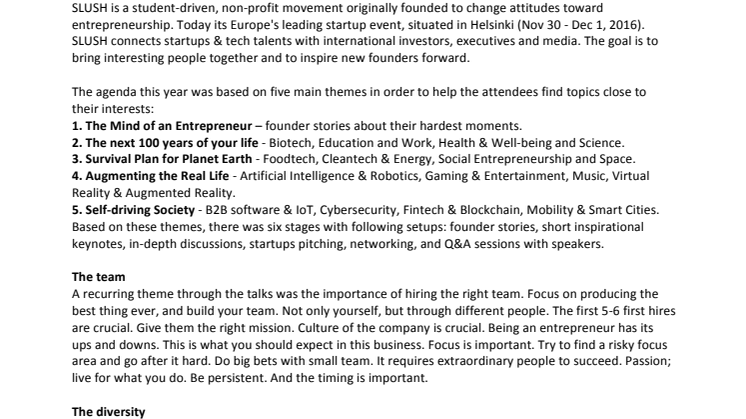Blogginlägg -
Reflections from SLUSH
SLUSH is a student-driven, non-profit movement originally founded to change attitudes toward entrepreneurship. Today its Europe's leading startup event situated in Helsinki, this year held on Nov 30 to Dec 1. SLUSH connects startups & tech talents with international investors, executives and media. The goal is to bring interesting people together and to inspire new founders forward.
The team
A recurring theme through the talks was the importance of hiring the right team. Focus on producing the best thing ever, and build your team. Not only yourself, but through different people. The first 5-6 first hires are crucial. And give them the right mission. Culture of the company is crucial. Being an entrepreneur has its ups and downs. This is what you should expect in this business. Focus is important. Try to find a risky focus area and go after it hard. Do big bets with small team. It requires extraordinary people to succeed. Passion; live for what you do. Be persistent. And the timing is important.
The diversity
A majority of the CEO’s in the tech world of today may be middle-aged men. But not only these voices are important when it comes to successful entrepreneurship. The founder of Spotify, Daniel Ek, got a question on the journey within his company – from ”janitor” to CEO. He answered the team is key. ”The title doesn’t matter, I always had the same goal. Everyone in the team has the same mission.” With this being said, I don’t think it would be too hard to reach a better balance on equality and diversity at SLUSH. Just look at the teams of these companies, and chose that person that can represent a broader and more comprehensive dimension on set. This would, as one of the speakers said, give a more extensive spectrum of thoughts and ideas. According to a study on Linkedin, they said as few as 20% have a strategy. And as the speaker said, these companies will have a great advantage on the years to come. A diverse network gives broader competence, diversity, and opportunities.
Compare it with the Malmö based Media Evolution, who arranges the annual media conference The Conference. A few years ago, a majority of the speakers and attendees was white middle-aged men. They decided that 50/50% of the speakers should be men/women. Not only did they succeed, it also led to the increasing number of female attendees. Today also this number is 50/50.
The fuckups
Failure is a hot topic in the startup world. Spotify initially disregarded the mobile revolution. It was at the get-go great but since they are a freemium-product, they are in need of an active community. It was a strategic mistake 3 years back, which took 18 months to fix. If they had waited 6 more months, maybe Spotify would have died, says Daniel Ek, adding, “Every big company has at least 3 near deaths”.
“We killed creativity due to hierarchy, structure and well-organized management – with best intention; To have control. However, it did lead to create Supercell. If it feels safe, your not driving fast enough. Innovation is taking risks. You are going to fail more often than succeed”, says Illka Paanen, CEO Supercell.
“Skype was born thanks to Kazaa dying. The failure cost a lot of stress, but it was very educational. We learned about the technique, market, laws etc. Expect 25 % of the companies you invest in to fail. Look at failures as part of the process. This is you where you try out new things”, says Niclas Zennström, CEO Skype.
The energy
Pekka Lundmark, CEO, Fortum talked about how rethinking energy is a fundamental part of the survival plan of the planet earth. They have consumer data on 1.3 million energy users. The world population is growing, standards are increasing. Big parts of the world are still without electricity. Everything is based on electricity in our modern society. We can expect at least double consumption in the next 20 years. New mega cities, mostly in Asia, are arising. How to live with the waste, which will double from 2015 to 2025?
In 2030 = 1 trillion devices connecting to massive centers that crunch all this data. Here are the big opportunities for startups. The investment will not come from (”poor”) governments, but from private companies, venture capital industry etc. Fortum invests 100-200 million euro in the most promising energy ventures in the coming 3-4 years. Everything needed is not yet invented. Huge potential for innovation. Digitalization is key.
The new technique
The spotlights at SLUSH were on cutting-edge technologies such as virtual reality, augmented reality/mixed reality, artificial intelligence and Internet of things.
10 million Google cardboard has been shipped. Google's new virtual-reality platform, Daydream, enables high quality mobile vr. They work in close collaboration with smartphone manufactures to optimize the experience. Available in Sweden in the beginning of next year. https://www.youtube.com/watch?v=lo3GTYSFhzw
Hololens is a Microsoft product that is the first self-contained, holographic computer, enabling you to engage with your digital content and interact with holograms in the world around you. Multiple sensors, advanced optics, and a custom holographic processing unit, which enable us to go beyond the screen. There are numerous application areas such as visualize your work, share ideas with others, more immersive ways to play, teach and learn, collaborate, explore new places, create new things, remote instructions, architecture, furniture design, production, space science, gamifications of tasks, heads up gps etc. https://www.youtube.com/watch?v=xXy7lbs-D48
Finally,something on IoT which is about sensors and technology. What happens when IoT moves from tech to services? Ex uber, airbnb, billion valuations are based on the use of sensors. Most successful digital platforms can reach almost monopoly in limited time, allowing us to do things we could not do before, simultaneously granting very little power to their users or the societies they work in. The way people come together and create value is changing. This in turn, changes how we define ourselves as human beings.
According to a survey: 1/4 of Americans earned money from the digital platform economy in the last year; giving rides, delivering merchandise, organize meetings, meeting on tinder, renting out their homes and performing tasks. Are we giving all our interaction to work through these platforms?
One discussion is about the risk of jobs going away when these platforms, such as airbnb and amazon, appears. Other discussions talked about the contra movements to this, such as Kickstarter, where these platforms create jobs instead.
Overall conclusion
SLUSH is a great platform for startups. Strong networking possibilities and trendspotting. However, it was an extremely homogeneous group, both on stage and overall attendees. A crushing majority was white, middle aged men, which creates a monotonous, stereotypical platform. We Swedes were not better. At the startup collective Swedish hotspot, which gathered speakers from 40 companies representing “the next generation o f Swedish cutting edge startups”, was represented by 37 white men and 4 white women.
Although, I could still recommend this conference. It is a both time and price worthy conference. 2 days, 15,000 attendees, 1,700 startups, 800 investors, and over 600 journalists. It is also an educational and inspiring happening from an event planning perspective; How to plan, arrange and design events. SLUSH is working actively on improving the sustainability performance. Next year I will follow the talks streamed online (unless they managed to advance in the diversity aspect – then I’m returning for sure) while also hoping they start a video archive so that you can spread the most interesting segments afterwards.
You find the full review as pdf below.
About Lotta Johansson
Lotta has worked many years in Brussels with business intelligence, communication and EU relations at the Swedish Embassy, the regional office West Sweden and the European network Airport Regions Conference. She has a Bachelor Degree in Media and Communications, and speaks five languages.
On NetPort Science Park Lotta works as a project manager and communication officer. She manages the communications channels and works with concept development, which includes an expansion of 700 new work places.
Ämnen
- Energifrågor
Kategorier
- startups
- #tech
- #slush
Regioner
- Blekinge

